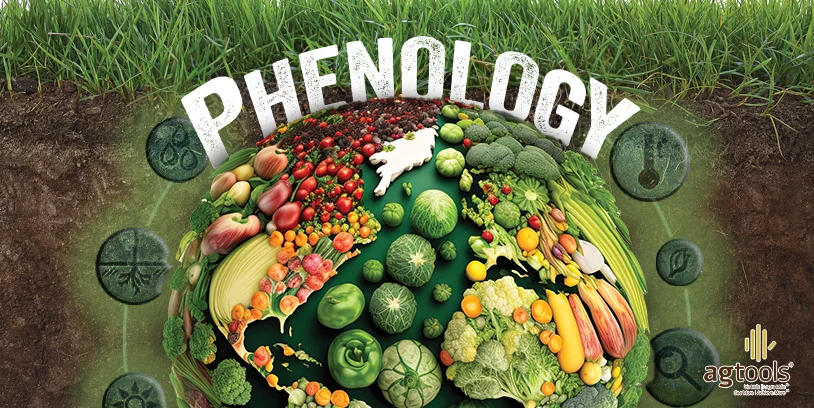Article Courtesy AgTools
Phenology -the cycle of plant growth stages influenced by weather conditions- should be top of mind for all of us involved in food science. As we strive to make our global food system more sustainable and resilient in the face of climate change, understanding phenology is no longer a luxury; it’s a necessity.
Fruit and vegetable production begins with the germination of seeds. It continues with the unfolding of leaves, the formation of lateral shoots, the elongation of the stem as a preparation required for the emergence of inflorescences (flowering), the formation and maturation of fruits, and finally, the senescence (deterioration) of both the fruit and the whole plant.
The plant’s growth and development stages are called phenological stages, and their occurrence is closely related to weather conditions.
Climate change is here, and it’s affecting the quality and yield of fruits and vegetables in ways we’re just beginning to comprehend.
Temperature swings, intense rainfall, and droughts all have a tangible impact on our crops’ productivity and growth. High and prolonged humidity, for instance, can foster fungi proliferation, damaging crops such as mangoes or pineapples.
Hence, keeping an eye on daily temperature, rainfall, and wind patterns can help us make preemptive decisions, reducing losses and ensuring consistent, quality produce.
How Climate Changes Affect Fruit Crops
Specific fruit crops, like mangoes, grapes, and papayas, react very sensitively to temperature changes.
- An increase in temperature may trigger abnormal flowering, poor fruit set, and reduced yield in mangoes.
- Meanwhile, grapes face delayed ripening and reduced quality due to extreme temperatures.
- Papayas aren’t spared either; higher temperatures can induce flower drops and sex changes in the plant.
Related Article: Tropical Fruits: Queens of Social Networks
Understanding the relationships between temperature and phenology is crucial to managing these crops effectively and sustainably.
It is also important to note that climate change may have either beneficial or detrimental effects on some crop cultivation, depending on the geographical location.
For example, mango cultivation may increase in regions where low temperatures currently are a limiting factor for the cultivation of this fruit. Conversely, several suitable areas for traditional mango cultivation will experience risks of abnormal flowering, poor fruit set, and reduced yield.
Meanwhile, drought has drastic effects on bananas and avocados. Bananas experience a significant drop in productivity under drought stress, while avocados face fruit and flower drops due to prolonged water stress.
Citrus trees are a case study of how temperature and water stress brought on by climate change can disrupt phenology.
Unusually high temperatures and post-pollination water stress inhibit ovule fertilization, reducing fruit set and yield. These conditions also lead to poor fruit growth, ripening, and nutrient uptake, negatively impacting both fresh fruit markets and fruit-based industries.
How do we Navigate These Challenges?
A multifaceted approach is necessary, embracing robust irrigation strategies, improved nutrition, and targeted pruning. We can also turn to innovative genetic and molecular approaches, like developing heat and drought-resistant crop varieties.
Shading can also offer a simple but effective way of regulating leaf temperatures and relieving water vapor pressure in citrus trees.
Unpredictable climate changes are challenging the phenological stages of plants, impacting the quality of our crops, and threatening the efficiency of our food production and distribution systems.
But this is not new. What is new is that we need a greater understanding of how to leverage phenological phases to reduce waste and increase quality in order to lower the carbon footprint of food production.
As food scientists and technologists, we have a vital role to play. By educating ourselves and others and by leveraging our unique expertise, we can help build a more sustainable, resilient global food system in the face of climate change.
Remember, this is not just about the future of our industry. It’s about the future of our planet. Let’s make it count.
The article was originally published in the September 2023 issue of Food Technology (https://www.ift.org).
Authors: Armando Carrillo López, Daniela Méndez, Martha Montoya, Javier Rafael Naranjo and Jesús Barajas Prado.


